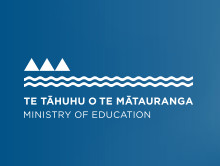He Tirohanga Whānui me ngā Āhuatanga Reo
Overview of Stories and their Language Features
E ono ngā kōrero o roto i te pukapuka Te Wharekura 89, ā, kotahi hoki te rārangi pārongo. Kei ngā whārangi e whai ake nei he paku whakamārama mō ia kōrero. Kua tohua te momo reo tuhi, ōna āhuatanga, me ētahi tauira nō roto tonu i ia kōrero. Ko te whāinga, kia āhei ngā ākonga ki te torotoro i te whānuitanga o ngā momo reo tuhi me ngā āhuatanga o tēnā, o tēnā momo tuhituhi.
There are six pieces of writing in the book Te Wharekura 89 as well as a list of information at the back. The following pages provide a brief overview of each story, the language style, features of the language style and some examples from the story. The intention is that students will begin to gain an understanding of the range of language styles and their features.
He Maumaharatanga ki te Pakanga Tuarua o te Ao
nā Dick Grace
He taki whaiaro (Personal recount)
Tirohia te whārangi 10 o tēnei pukapuka.
He tirohanga i ngā tau o mua, i te wā o te Pakanga Tuarua o te Ao. I whakahua mai te āhua o te tupuranga i Tūpāroa, te ngākaunui o te tangata, tētahi ki tētahi. I kōrero hoki te kaituhi mō te āhua o te kohi pūtea hei hoko i te taraka Te Rau Aroha.
In this memoir, Dick Grace recounts life as a schoolboy in an East Coast Māori settlement during the Second World War. He recalls how the community contributed to the war effort by raising money for Te Rau Aroha, a canteen truck for the Māori Battalion.
Te Tohu Toa o Te Moana-nui-a-Kiwa Ngārimu
nā Wiremu T. Ngata
He taki whānui (General recount)
Tirohia te whārangi 11 o tēnei pukapuka.
Kātahi rā te ihi, te wehi, me te wana o ō tātou hōia ki te mura o te ahi. Kei tēnei kōrero ka kite tātou i te take i whiwhi ai a Te Moana-nui-a-Kiwa Ngārimu i tana tohu toa, te Rīpeka a Kuini Wikitōria.
The bravery of our soldiers is really shown in this article. This story tells us all why Te Moana-nui-a-Kiwa Ngārimu received his award for bravery, the Victoria Cross.
Te Tono
nā Tangihoro Fitzgerald
He tuhinga whakaahua (Descriptive writing)
Tirohia te whārangi 12 o tēnei pukapuka.
He rotarota e kōrero ana mō te urunga atu o te iwi Māori ki te Pakanga Tuarua o te Ao. I taua wā tonu kua whai karaitiana te nuinga. Ka whai te whakaari poto i tēnei rotarota poto.
A poem about why young Māori men went to war. This leads into the short play that comes next in the book.
Te Poroporoaki
nā Tangihoro Fitzgerald
He tuhinga whakangahau (Writing to stimulate the mind and uplift the spirit)
Tirohia te whārangi 13 o tēnei pukapuka.
He whakaari poto tēnei. Kei te ahu atu te kaipuke Aquitania ki Ingarangi. Kei runga ngā hōia Māori me ngā hōia Pākehā. He whakawhiti kōrerorero tēnei i waenganui i te tokorua o ngā hōia Māori me tētahi hōia Pākehā.
This is a short play involving 2 Māori soldiers and 1 Pākehā soldier. They are on board the Aquitania heading for England.
Te Kuku o Taku Manawa
nā Te Urikore Biddle
He taki whānui (General recount)
Tirohia te whārangi 15 o tēnei pukapuka.
He taki whānui te take o te tuhinga nei Te Kuku o Taku Manawa. Kei te aro atu tēnei tuhinga ki ngā whakaari, ngā haka, me ngā waiata i titoa mō te Pakanga Tuarua o te Ao, i titoa rānei i taua wā.
This is a general recount that talks about the play Te Kuku o Taku Manawa. It also looks at some of the plays, songs, and haka that were written during or about the war.
He Hokinga Mahara
nā Matiu Love ngā kōrero, nā Hera Black-Taute i whakamāori
He taki whaiaro (Personal recount)
Tirohia te whārangi 17 o tēnei pukapuka.
He taki whaiaro te take o te pakikōrero e kīia nei He Hokinga Mahara. He hokinga mahara nō te hōia nei, a Matiu Love, i a ia e pakanga ana mō Te Ope Taua 28.
The purpose is to retell a personal experience. The writer describes some of the events that occurred while he was fighting in the 28th Battalion and provides some personal interpretation in the form of personal comments and descriptions of emotional responses.
Ngā Tohu Toa a Te Ope Taua 28
nā Te Pou Taki Kōrero ēnei pārongo i kohi
Tirohia te whārangi 19 o tēnei pukapuka.
He rārangi ingoa, he kohinga whakaahua hoki tēnei o ngā hōia o Te Ope Taua 28 nā rātou i whiwhi tohu toa mō ā rātou mahi i te Pakanga Tuarua o te Ao. Kei ēnei whārangi ētahi whakaahua hoki o ngā tohu toa i whakawhiwhia ki aua hōia.
This is a list of names and collection of photographs of soldiers of the 28th Māori Battalion who were awarded medals for their deeds during the 2nd World War. There are also photographs of the awards given on these pages.




